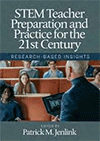
STEM Teacher Preparation and Practice for the 21st Century
Research-based Insights
Edited by:
Patrick M. Jenlink, Stephen F. Austin State University
Published 2022
STEM Teacher Preparation and Practice for the 21st Century: Research-based Insights introduces the reader to a collection of thoughtful, research-based works by authors that represent current thinking about the future of science, technology, engineering, and mathematics or STEM as it known today, as well as STEM education for a rapidly evolving global society and the preparation of STEM teachers to meet the educational needs of a changing educational landscape. Each chapter focuses on STEM teaching and the preparation of teachers who will enter classrooms to instruct the next generation of students in STEM.
Research in the learning sciences focuses on the cognitive, epistemological, and socio-cultural characteristics of scientific and engineering research communities in their efforts to improve Science, Technology, Engineering, and Mathematics (STEM) education. STEM education is a means to help individuals develop different strategies in order to solve interdisciplinary problems and gain skills and knowledge as they are engaged with STEM related activities through formal and informal learning programs.
Research also suggests that STEM may well stand as the new general education for the 21st century. In much of the current discourse on teacher quality and preparation, two essential points for consideration have emerged: the strength of the relationship between teacher content knowledge and student achievement, and the specific representations of knowledge that are most conducive to effective teaching. Add to these two points one additional: the nature of transforming a chaotic system of discreet preparation and clinical experiences into a coherent, aligned and logical system of continuous and progressive development and support throughout a teacher’s career. These three points apply to STEM teacher preparation, induction and professional learning as well as to teacher preparation, induction and professional learning in general.
Importantly, the contributing authors to this book have brought to the foreground research-based insights concerning STEM teacher preparation. Each chapter presents clear paths to understanding and reimagining STEM teaching and the importance of STEM teacher preparation, acknowledging the value of STEM literacy and the interdisciplinary nature of STEM teaching.
CONTENTS
Preface. Acknowledgments. A Global Reimagining of STEM Teacher Preparation and Practice, Patrick M. Jenlink. Teachers’ Implementation of STEM Instructional Practices in the Context of the STEM Academy: A Mixed Methods Study, Elizabeth L. Adams, Leanne R. Ketterlin-Geller, Karen Pierce, and Tryna Knox. Integrated STEM: Interdisciplinary Teams and Proposed Framework for Preservice Teacher Utilization, Andrea C. Burrows, Trina J. Kilty, and Timothy F. Slater. Preparing Preservice STEM Educators in Virtual Settings: Navigating a Pedagogical Approach Around Social-Distancing Barriers, Joseph Mukuni and Michael Shumate. Reimagining STEM Education Framework Through an Emerging Synthesis, Aubrey H. Wang, Shaily Menon, and Neha Ghadge. Preparing Preservice STEM Teachers: Rehearsing Whole Class Discussion, Leigh A. van den Kieboom and Jill McNew-Birren. Developing Inclusive STEM Educators: Preservice Dual Educators’ Identity Formation During the Clinical Year, Jennifer L. Goeke and Jillian Reich. Exploring Elementary Teachers’ Beliefs and Perceptions About Science Inquiry in Private U.S. Islamic Schools, Linda Hamadeh and Lara K. T. Smetana. Using Contextualized Scenarios to Promote Science and Mathematics Teachers’ Reasoning Processes, Lynn Sheridan and Tracy L. Durksen. Practicing Practice: Investigating the Potential of Simulated Teaching in STEM Teacher Preparation, Heather Howell, Jamie N. Mikeska, Kersti Tyson, Pamela S. Lottero-Perdue, and Cathy S. Liebars. A Call to Action: Redefine District Role in Preparing STEM Teachers for the Next Generation of STEM Education, Mark C. Avitabile and Aubrey H. Wang. Epilogue—Meeting the Challenges of STEM Teaching and Learning in the 21st Century: A Vision of STEM Architecture, Patrick M. Jenlink. About the Editor. About the Contributors.
-
Paperback979-8-88730-039-9
Web price: $45.04 (Reg. 52.99)
-
Hardcover979-8-88730-040-5
Web price: $80.74 (Reg. 94.99)
- eBook979-8-88730-041-2

- EDU029010 - EDUCATION: TEACHING METHODS & MATERIALS: Mathematics
- EDU029030 - EDUCATION: TEACHING METHODS & MATERIALS: Science & Technology
- EDU037000 - EDUCATION: Research
-
 (Re)Envisioning Social Studies Education Research
Current Epistemological and Methodological Expansions, Deconstructions, and Creations
(Re)Envisioning Social Studies Education Research
Current Epistemological and Methodological Expansions, Deconstructions, and Creations
-
 A Practical Guide to Exemplary Professional Development Schools
A Practical Guide to Exemplary Professional Development Schools
-
 Catalytic Improvement Communities
Cultivating Flourishing Schools
Catalytic Improvement Communities
Cultivating Flourishing Schools
-
 Diversity as Strategic Opportunity
Exploring New Paths to Good Administration
Diversity as Strategic Opportunity
Exploring New Paths to Good Administration
-
 Qualitative Research With Diverse and Underserved Communities
Qualitative Research With Diverse and Underserved Communities
-
 The AMTE Handbook of Mathematics Teacher Education
Reflection on Past, Present and Future – Paving the Way for the Future of Mathematics Teacher Education, Volume 5
The AMTE Handbook of Mathematics Teacher Education
Reflection on Past, Present and Future – Paving the Way for the Future of Mathematics Teacher Education, Volume 5
-
 The Undivided Life
Faculty of Color Bringing Our Whole Selves to the Academy
The Undivided Life
Faculty of Color Bringing Our Whole Selves to the Academy

